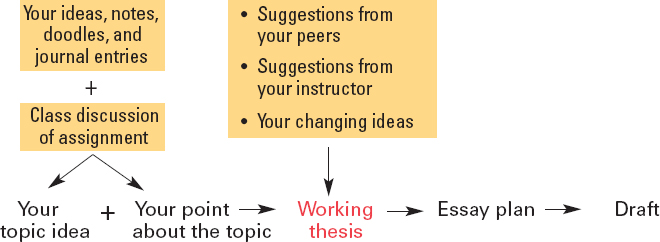How to Discover a Working Thesis
Look for specific advice under headings that mention a thesis in Chs. 4–12. Watch for the red labels that identify thesis examples.
It’s rare for a writer to develop a perfect thesis statement early in the writing process and then to write an effective essay that fits it exactly. What you should aim for is a working thesis — a statement that can guide you but that you will ultimately refine. Ideas for a working thesis are probably all around you.
Your topic identifies the area you want to explore. To convert a topic to a thesis, you need to add your own slant, attitude, or point. A useful thesis contains not only the key words that identify your topic but also the point you want to make or the attitude you intend to express.
Topic + Slant or Attitude or Point = Working Thesis

Suppose you want to identify and write about a specific societal change.
| TOPIC IDEA | old-fashioned formal courtesy |
Now you experiment, testing ideas to make the topic your own.
| TRIAL | Old-fashioned formal courtesy is a thing of the past. |
Although your trial sentence emphasizes change, it’s still circular, repeating rather than advancing a workable point. It doesn’t say anything new about old-fashioned formal courtesy; it simply defines old-fashioned. You still need to state your own slant — maybe why things have changed.
| TOPIC IDEA + SLANT | old-fashioned formal courtesy + its decline as gender roles have changed |
| WORKING THESIS | As the roles of men and women have changed in our society, old-fashioned formal courtesy has declined. |
See advice about revising a thesis.
With this working thesis, you could focus on how changing societal attitudes toward gender roles have caused changes in courtesy. Later, when you revise, you may refine your thesis further — perhaps restricting it to courtesy toward the elderly, toward women, or, despite stereotypes, toward men. This chart suggests ways to develop a working thesis.
Once you have a working thesis, be sure its point accomplishes the purpose of your assignment. Suppose your assignment asks you to compare and contrast two local newspapers’ coverage of a Senate election. Ask yourself what the point of that comparison and contrast is. Simply noting a difference won’t be enough to satisfy most readers.
| NO SPECIFIC POINT | The Herald’s coverage of the Senate elections was different from the Courier’s. |
| WORKING THESIS | The Herald’s coverage of the Senate elections was more thorough than the Courier’s. |